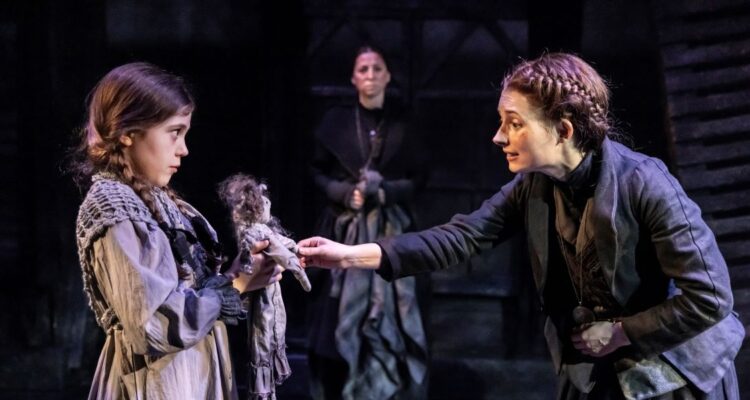‘The Whistling’ is adapted from a successful novel by Rebecca Netley, which is both a detective thriller and a ghost story. It owes a bit to both Daphne du Maurier’s ‘Rebecca’ and also to the ‘Turn of the Screw’; but in this skilful, pacy adaptation by Rachel Wagstaff and Duncan Abel, it fully develops a life of its own in a production that has many thrills and shivers suitable for an autumnal outing to Sonning.
All the ingredients of a good thriller are present – a remote and wild Scottish island, a gloomy, secluded mansion, Iskar House, full of recent and remote history, and a closed community of islanders, all leading blighted lives with elements of mystery and secrets yet to be revealed. Our guide is a newly arrived governess, Elspeth, herself fleeing grief of her own. Her charge, Mary, has recently lost her mother and brother, and lives in the big house without speaking. Elspeth has the task of reviving her spirits before her fairly sinister aunt Miss Gillies, and her even weirder sidekick, Greer, pack the little girl off to a mainland institution. On the evening she arrives objects move randomly and a sinister whistling is heard, the first of a long series of menacing happenings that ultimately reveal the story as a murder mystery. A plethora of local characters, whether the local clergyman and his plausibly kindly wife, or the local outcast, Ailsa, may be less or more than they seem.
There is some very fine characterisation in the acting here and some truly unexpected twists to the plotting. At the heart of it is a radiantly idealistic and energetic performance by Rebecca Forsyth as Elspeth. We react with her to much of the sinister action, and she grows in authority and conviction as the evening progresses. In fact it is very much an evening for the women in the cast, as there is only one male actor (Jonny McGarrity) who gets to play a number of smallish, functional roles. Many of these female roles are strong and conflictual – Stephanie Farrell outdoes Mrs Danvers in disdainful froideur as Violet Gillies, matched all the way by Raghad Chaar as her resentful servant Greer. Heather Jackson chews the scenery, almost literally, as the resourceful white witch, Ailsa; and Susie Riddell, carefully unveils the many layers of Bridget, the parson’s wife. There is also a delightfully focused, still performance from Saffron Haynes, as the child, Mary, and a chilling intervention from Nadia Kramer, as the previous governess, Hettie.
The creative team do a really excellent job. Joseph Pitcher is both director and movement director, and that combination is a nod to one of the great successes of the evening, where there is so much restless physical activity in the shadows as much as on the stage itself. The set is spare and minimalist, with structural elements as a backdrop to suggest exteriors, and a small collection of furniture which is rapidly and repeatedly reassembled by the cast in the forms of hooded and shadowy figures that blend into the general shade of grey. Particularly impressive is a rowing boat, put together for the climactic scene out of what previously were mere breakwaters. Costumes are mostly a sepulchral black or monochrome, but with a few flashes of significant colour at key moments. In any thriller the soundscape and lighting are crucial, and here Simon Arrowsmith and Richard G Jones really distinguish themselves with detailed and unexpected effects that both anticipate and underline key points in the action, while setting up false and distracting leads as well.
As always, the play comes as a delightful package with splendid buffet in the restaurant beforehand – this time with a Scottish-themed menu – and of course the timeless setting on the Thames as an exquisite backdrop.
Based on the novel by Rebecca Netley
Adapted by Rachel Wagstaff & Duncan Abel
Director: Joseph Pitcher
Cast: Raghad Chaar, Stephanie Farrell, Rebecca Forsyth, Heather Jackson,Nadia Kramer, Jonny McGarrity, Saffron Haynes, Susie Riddell
2 hours 30 mins with interval
Until 16 November 2024
Photo Credit: Pamela Raith

